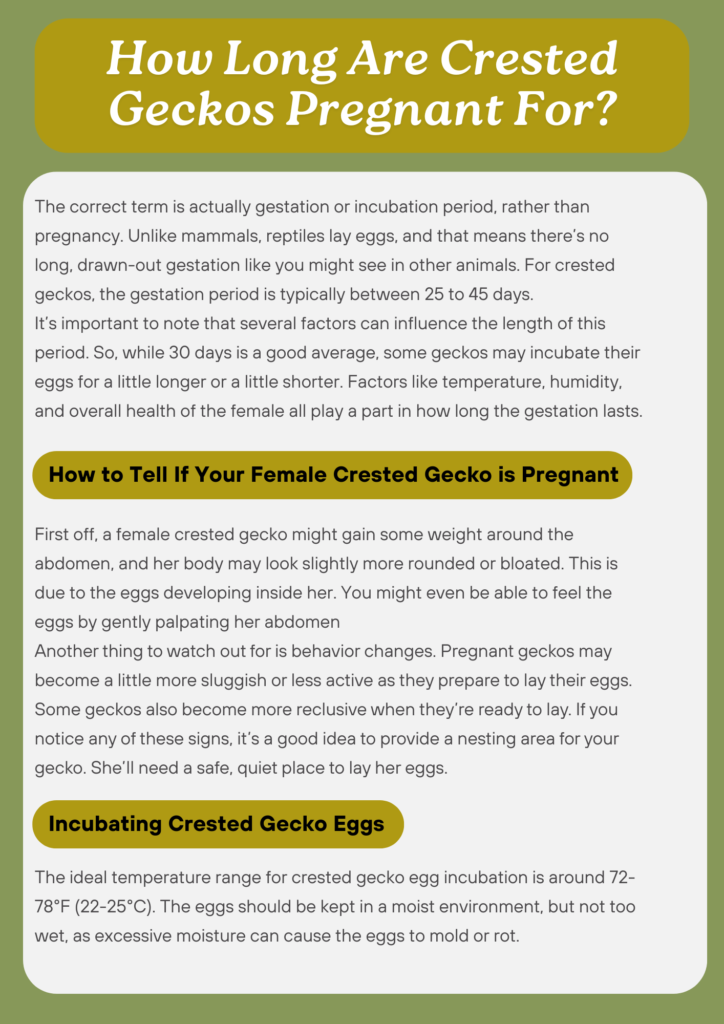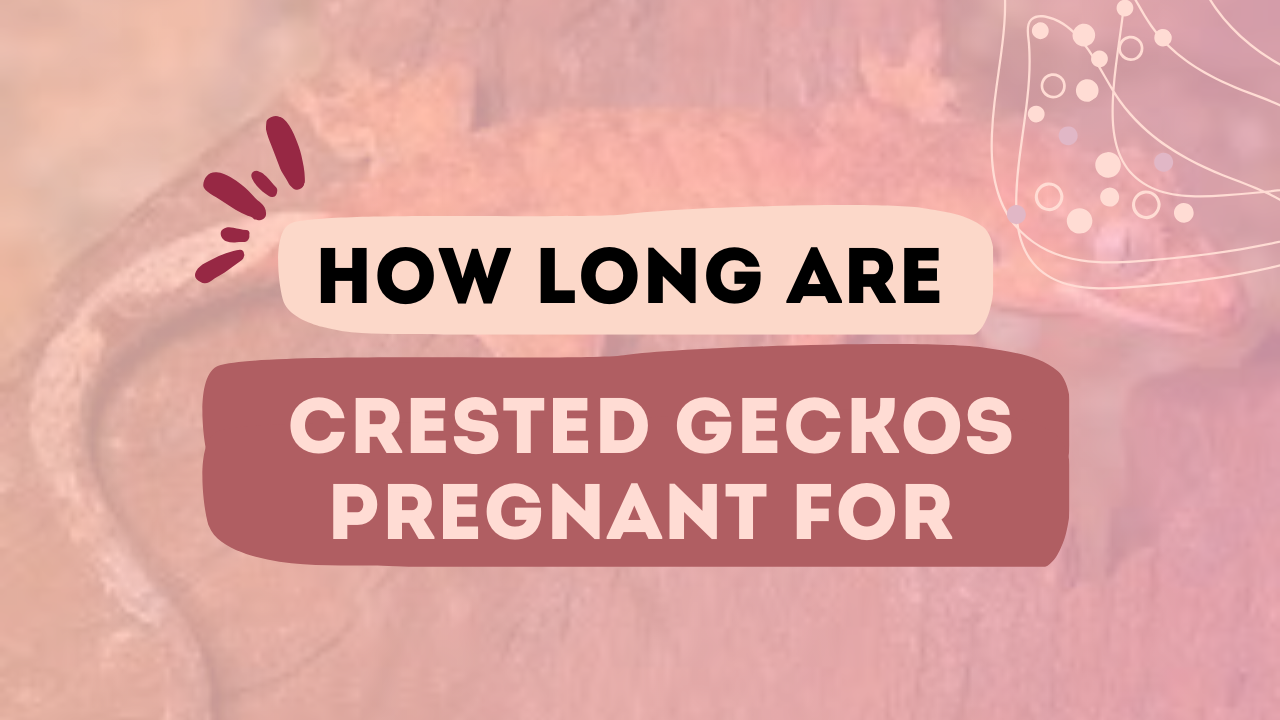When you’re a reptile enthusiast, it’s always fun to learn about your pet’s biology and reproductive habits. One question that many people ask when they get their first crested gecko (or even if they’re thinking about breeding them) is, “How long are crested geckos pregnant for?” While it’s a simple question, there’s actually quite a bit to unpack if you want to understand it properly. Don’t worry, I’ll make sure to explain it in a clear and easy way – but I might get a little sidetracked here and there. Happens to the best of us, right?
Crested geckos, Correlophus ciliatus, are one of the most popular pet reptiles. These cute little guys are native to New Caledonia and are known for their unique crests on their heads and tails. They’re a pretty low-maintenance pet for most people, but if you’re breeding or even just curious about your gecko’s life cycle, you might be wondering how long these little guys carry their eggs. Well, the answer isn’t as straightforward as just a number, but let’s get into the details of crested gecko pregnancy and their reproductive habits.
Crested Gecko Reproduction: The Basics
Before we get into the exact pregnancy period, let’s quickly go over how crested geckos reproduce. Like many reptiles, crested geckos lay eggs instead of giving birth to live young. When a female gecko is ready to breed, she will lay a pair of eggs—typically two at a time. These eggs are soft at first and become hard as they mature. Female geckos are actually capable of storing sperm for a while, which means they can lay eggs even without mating continuously.
For the most part, breeding happens when males and females are housed together, and if conditions are right, they’ll mate. Females can lay several clutches of eggs in a year (usually around 2-3), depending on their health, age, and environmental conditions. Now, when we talk about how long they’re pregnant, it’s important to remember that they’re not pregnant in the same way mammals are—they’re carrying eggs inside their bodies that will be laid eventually. This incubation period can vary a little based on different factors. But let’s dive deeper into the actual “pregnancy” length.

The Gestation Period: How Long Are Crested Geckos Pregnant For?
So, how long are crested geckos pregnant for? Well, in the case of crested geckos, the correct term is actually gestation or incubation period, rather than pregnancy. Unlike mammals, reptiles lay eggs, and that means there’s no long, drawn-out gestation like you might see in other animals. For crested geckos, the gestation period is typically between 25 to 45 days. Yes, you read that right! That’s not a long time at all, is it?
It’s important to note that several factors can influence the length of this period. So, while 30 days is a good average, some geckos may incubate their eggs for a little longer or a little shorter. Factors like temperature, humidity, and overall health of the female all play a part in how long the gestation lasts. For example, warmer temperatures can sometimes speed up the process, while cooler temperatures may slow it down.
Additionally, if the female gecko is under stress or isn’t eating well, this can also affect the egg-laying process. A stressed or unhealthy female might take longer to produce or lay her eggs, or she might even stop laying altogether. So, it’s not just about how long she’s pregnant but also about making sure the environment is just right for her to successfully produce healthy eggs.
How to Tell If Your Female Crested Gecko is Pregnant
Okay, so you’re probably wondering, “How do I know if my gecko is pregnant?” Good question! The signs of pregnancy in crested geckos can be a little tricky to spot at first, especially since they don’t get super “big” like mammals do when they’re carrying eggs. However, as the eggs develop, you may notice a few things that can indicate your gecko is expecting.
First off, a female crested gecko might gain some weight around the abdomen, and her body may look slightly more rounded or bloated. This is due to the eggs developing inside her. You might even be able to feel the eggs by gently palpating her abdomen (but only do this if you’re comfortable, and never squeeze). As the eggs near maturity, you may also see visible bulges on the sides of her body.
Another thing to watch out for is behavior changes. Pregnant geckos may become a little more sluggish or less active as they prepare to lay their eggs. Some geckos also become more reclusive when they’re ready to lay. If you notice any of these signs, it’s a good idea to provide a nesting area for your gecko. She’ll need a safe, quiet place to lay her eggs.
The Egg-Laying Process
Once the gestation period is complete, and your gecko is ready to lay her eggs, you’ll see her looking for a suitable spot to do so. Female crested geckos will often dig a hole or search for a damp, safe area where she can lay her eggs. She’ll typically lay two eggs at a time, and they’ll be soft when they come out. After laying, the eggs will start to harden and calcify, which is when you can begin incubating them.
Incubating Crested Gecko Eggs
Once the eggs are laid, they’ll need to be incubated in the right conditions to hatch successfully. The ideal temperature range for crested gecko egg incubation is around 72-78°F (22-25°C). The eggs should be kept in a moist environment, but not too wet, as excessive moisture can cause the eggs to mold or rot. You can use a container with a damp substrate, like sphagnum moss or vermiculite, to maintain the right humidity levels.
Generally, crested gecko eggs will take anywhere from 60 to 120 days to hatch, depending on the temperature and humidity. Warmer temperatures will cause the eggs to hatch more quickly, while cooler temperatures will extend the incubation period.
Conclusion
So, how long are crested geckos pregnant for? Well, it’s not exactly a pregnancy like you might think. The gestation period for crested geckos is around 25 to 45 days, depending on several factors, including temperature, humidity, and the health of the female. Understanding this period is key if you’re looking to breed or care for a pregnant crested gecko. The more you know about your gecko’s life cycle, the better you’ll be at providing the best care for your little reptilian friend.
Hope this helps clear things up for you! Let me know if you have any other questions—I’m always happy to chat about geckos and their egg-laying adventures.

